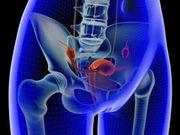Findings for young women with endometrial cancer
FRIDAY, Jan. 27, 2017 (HealthDay News) — For young patients with endometrial cancer, survival does not appear to be significantly impacted by hormone therapy (HT) before surgery to preserve fertility, according to a study published online Dec. 27 in Cancer.
Zoë R. Greenwald, from McGill University in Montreal, and colleagues selected patients with localized, low-grade endometrial cancer (aged younger than 45 years) from the Surveillance, Epidemiology, and End Results database between 1993 and 2012. Comparable groups receiving HT or primary surgery were selected with propensity score matching. Data were included for 6,339 women, 161 of whom received HT and 6,178 of whom received primary surgery.
All-cause mortality after 15 years of follow-up was 14.1 percent (95 percent confidence interval [CI], 6.7 to 28.4 percent) in the HT group and 9.3 percent (95 percent CI, 4.1 to 20.5 percent) in the propensity score-matched primary surgery group. HT-treated patients had higher cancer-specific mortality than patients treated with primary surgery (9.2 percent [95 percent CI, 3.4 to 24.0 percent] versus 2.1 percent [95 percent CI, 1.5 to 2.8 percent]); this difference was driven by three late deaths in the HT group. In sensitivity analyses using a broader definition of cancer-specific mortality there was no evidence of a statistically significant survival difference between the groups.
“The results of the current study indicate that the choice of HT by physicians and patients to preserve fertility, thereby postponing curative surgery, does not appear to worsen long-term survival appreciably,” the authors write. “Long-term survival for this population of young patients with low-grade endometrial cancer is excellent, with 10-year and 15-year overall survival rates of >90 percent, regardless of the primary therapy chosen.”
Full Text (subscription or payment may be required)
Copyright © 2017 HealthDay. All rights reserved.








